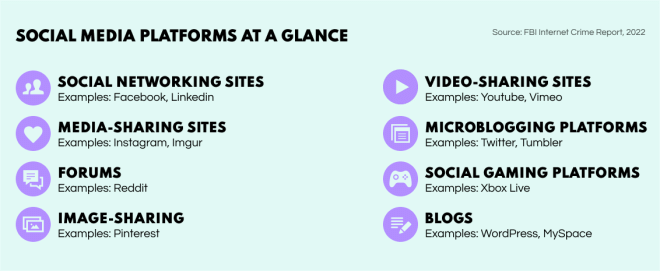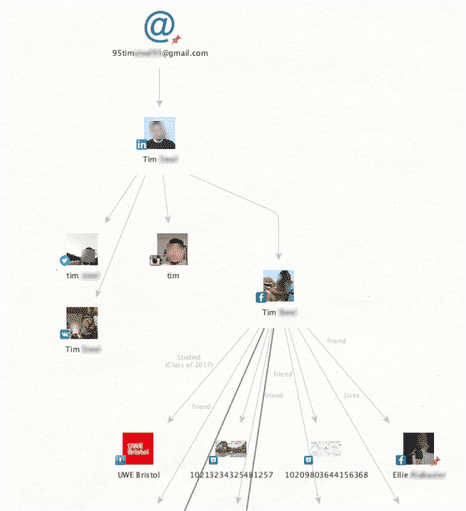A guide to gathering open source intelligence from social media
The rise of social media platforms has changed the way we communicate and access information. Open Source Intelligence (OSINT) has become an important tool for organizations, government agencies, and individuals to collect and analyze data from a variety of online sources, including social media.

Social media and their open source intelligence potential
1. Facebook
Facebook is a powerful platform for
open source intelligence because of its large user base and numerous features,
including profiles, business pages, and groups. Key aspects of open source
intelligence include profile analysis, geolocation data, and content analysis.
2. Twitter
Twitter is a valuable platform for open
source intelligence because it allows real-time monitoring of events and
conversations. Techniques for open source intelligence include monitoring subject
tags, keywords and user accounts, and extracting geolocation data.
3.
Instagram
Instagram is a visual platform that provides open
source intelligence opportunities through images, geolocation data, and
user-generated content. Key methods of intelligence gathering include image
analysis, user profiling, and hashtag tracking.
4. LinkedIn
LinkedIn is a key platform for open source intelligence for the professional
and corporate community. With detailed profiles and company pages, it is a valuable
resource for competitive analysis, talent identification, and corporate espionage.
Key technologies include profile analysis, network mapping, and job posting
analysis.
5. YouTube
YouTube is a rich source of
multimedia content that can provide valuable information and insights for open
source intelligence. Techniques for gathering intelligence include video analysis,
user profiles, comment analysis, and metadata extraction.
6.
Reddit
Reddit is a platform for discussion and content sharing
with a number of topic-centric communities called subreddits. Open source
intelligence opportunities on Reddit include tracking trending topics, monitoring
specific subreddits, and analyzing user behavior.
7. TikTok
TikTok is a short-form video platform that has become popular in recent
years. Open source intelligence technologies for TikTok include video analytics,
hashtag monitoring, and user analytics.
Types of information
that can be collected from social media
1. Personal
profile information
Static information about a specific user
that is provided and can be observed by those who access the profile. For example,
on LinkedIn, this might include a user's job title, current and former employers,
skills, and contact information.
2. Interaction
Users
on social media platforms can interact with the platform or other users in a variety
of ways. These forms of interaction include posting/commenting, replying to others'
content, posting images or videos, and liking or reacting to existing content.
3. Metadata
The information found on social media
platforms is not limited to text and images. It can also include contextual
information about said content snippets. Metadata can include the location tagged in
the post, the time the post was posted, and even the type of device used to take the
picture.

Social media open source intelligence tools and techniques
1. Manual search techniques
Manual search
techniques involve using the platform's built-in search function directly or using
advanced search operators to narrow down the results. This approach requires an
in-depth understanding of each platform's search capabilities and limitations.
2. Automation tools
Automation tools can streamline
the open source intelligence process and save time by scanning multiple platforms
and aggregating data, such as
Knowlesys Intelligence
System.
3. APIs and crawling
Application
Programming Interfaces (APIs) and web crawling techniques can be used to collect
large amounts of data from social media platforms. This approach typically requires
programming skills and an understanding of each platform's API limitations.
Ethical
and legal considerations of social media open source intelligence
When conducting social media open source intelligence, it is important to
understand the ethical and legal considerations involved.
1. Privacy
and anonymity
Respecting privacy and maintaining anonymity are
important aspects of social media open source intelligence. When conducting
research, it is critical to avoid violating one's privacy and protecting one's
identity.
2. Legal issues
Open source intelligence
practitioners must be aware of the legal implications of collecting information from
social media platforms, including data protection laws, terms of service agreements,
and copyright issues.
3. Ethical guidelines
Following
ethical guidelines and best practices is critical to conducting responsible social
media open source intelligence. This includes obtaining information only from open
sources, verifying information, and not engaging in hacking or other illegal
activities.
Real-world examples and case studies of social
media open source intelligence
To better understand the
applications and benefits of social media open source intelligence, let's look at
some real-world examples and case studies.
1. Terrorism and
extremism monitoring
Open source intelligence has played an
important role in tracking and monitoring the activities of terrorists and extremist
groups on social media platforms, leading to arrests and prevention of potential
attacks.
2. Corporate espionage and competitive analysis
Companies use social media open source intelligence to gain insight into
competitors' strategies, identify potential weaknesses, and discover new
opportunities.
3. Missing persons and criminal
investigations
Law enforcement agencies and private
investigators use social media open source intelligence to locate missing persons,
gather evidence in criminal cases, and track suspects.
4.
Geopolitical analysis
Analysts use social media open source
intelligence to monitor global events, track conflicts, and assess potential threats
in real time.

Tips for making the most of social media open source
intelligence
To make the most of your social media open source
intelligence efforts, consider the following tips:
1. Develop a
research plan
Developing a clear research plan helps ensure a
systematic and thorough approach to social media open source intelligence. This
includes defining goals, identifying target platforms, and selecting appropriate
tools and techniques.
2. Stay organized
Tracking
collected data and analysis is critical to effective open source intelligence. Using
tools such as spreadsheets, note-taking applications, and data visualization tools
can help maintain organization and streamline the analysis process.
3.
Validate information
Ensuring the accuracy and reliability of
the information collected is critical to the success of social media open source
intelligence. Tools such as cross-referencing data, checking multiple sources, and
using reverse image search can help validate findings.
4. Time
management
Effective time management is critical to conducting
social media open source intelligence, as information can quickly become outdated.
Prioritizing tasks, setting deadlines, and using automated tools can help optimize
the research process.
Courses, certifications and training
programs
To further improve your knowledge and skills in social
media open source intelligence, consider taking a course, getting certified, or
participating in a training program.
1. Online Courses
Many
online courses offer social media open source intelligence training, from
entry-level to advanced. Examples include Bellingcat's Online Investigation Toolkit,
SANS SEC487: Open-Source Intelligence (OSINT) Gathering and Analysis, and Udemy's
OSINT courses.
2. In-person training
Face-to-face
training programs and workshops provide hands-on learning experiences and
opportunities to network with open source intelligence practitioners. Events such as
OSINTcon and the OSMOSIS conference provide valuable training sessions.
3. Certification
Certifications can help validate
your open source intelligence skills and enhance your professional credibility.
Examples include the Certified in Open Source Intelligence (COSI) and the GIAC Open
Source Intelligence (GOSI) certification.
Resources and
Communities
To keep up with the latest trends, tools, and
technologies in social media open source intelligence, it is important to engage
with resources and communities that can support your learning journey.
1. Websites and blogs
Various websites and blogs
provide valuable information, tips, and updates on social media open source
intelligence. Examples include Bellingcat, IntelTechniques, and OSINTCurious.
2. Books and publications
Books and publications
can provide insight and insight into social media open source intelligence. Some
notable titles include “Open Source Intelligence Techniques” by Michael Bazzell,
“The Art of OSINT” by Chris Poulter, and “Hunting Cyber Criminals” by Vinny Troia.
3. Social media open source intelligence communities
Online communities, forums, and social media groups provide a platform for
open source intelligence practitioners to share knowledge, ask questions, and learn
about the latest trends and tools. Examples include OSINT subreddit, the OSINT.team
forum, and various LinkedIn and Facebook groups.
Conclusion
Social media open source
intelligence is a powerful tool for gathering intelligence across all domains. With
the right knowledge, tools and technology, individuals and organizations can
leverage the wealth of information available on social media platforms to make
informed decisions, reduce risk and gain a competitive advantage.